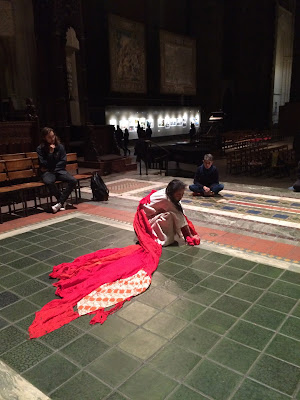 |
| The Lucinda Childs Dance Company’s Caitlin Scranton, Patrick John O'Neill, Sharon Milanese and Matt Pardo in Canto Ostinato (photo: John Sisley) |
 |
| Katherine Helen Fisher in Pastime (photo: John Sisley) |
More than a few times, as I sat watching the Lucinda Childs Dance Company at The Joyce Theater last evening, I thought of abstract painter Agnes Martin. Seeing the Martin retrospective at the Guggenheim Museum, which continues through January 11, demonstrated what I'd always heard about her painting but could never detect from reproductions in books and magazines. Calling her a minimalist doesn't tell the whole story.
You can read between Martin's meticulous, repetitive lines, read the energy, and there's so much there--a range of feeling, of humanity in its complexity painted in, not everything as perfect as first glance might suggest nor is it meant to be so. If you sincerely ask, the works will often show you where to look and what to listen for.
In the case of Lucinda Childs, the cool, remote severity of her physique and persona and her aesthetic of precise grids, repetitive motion and continuously slipping, interweaving geometric patterns might also have been a distraction, albeit a dazzling one. Her dancing, and her dancers's dancing, were and are like airy, graceful cursive script written across space with the aid of frictionless implements. The company, like a surface glance at Martin's brush strokes, reveals no hint of human individuality. In fact, when music drives the dancing--and Childs favors music that roughly upends or irresistibly and endlessly propels things--it can often suggest we read each member of the corps as sleek, high-grade machinery on the move. But what else is present?
The Joyce Theater season's first week highlights five decades of work from repertory as old as Pastime (1963), a Childs solo from her Judson Church days, and as current as this fall's Into View, premiered at UCLA. The second week's program, which I will see on Tuesday, features Dance (1979), the masterful collaboration of Childs, Philip Glass and Sol LeWitt where LeWitt's film of the original cast in action, jumbo images spanning the stage, plays over and with the current troupe.
The selections for this first week are instructive. One draws an impression of an American with that legendary sense of entitlement to open space; one who knows how to hook audiences with springy, lighter-than-air bodies, feet barely claimed by gravity; one winking at people who share her love for the unadorned inner systems of American ballet and Cunningham and, likely, Astaire; people who respond to the wry, sometimes surreal turns of a brilliant mind. All of this looks as glamorous as all get out (see 1993's Concerto, especially). It can knock you over. And the dancers, an elite corps, are on it.
In Canto Ostinato (2015), narrow, vertical lines of light, sliding across the backdrop at varying speeds, create elusive illusions of each member of the ensemble moving in a spatial groove of his or her own depth. Following those hallucinations, Into View--with its unsettling visual image of a tiny, distant sun surrounded by dusty orange haze--appears dynamic enough to be diverting but not much more, a good-enough Lucinda Childs piece. But here I noticed something happening between dancers that I had not seen before. It was fleeting but clear--eye contact and interaction with an unspoken purpose but a force readable past many rows of watchers. Again, I flashed back to Martin, to the feelings carefully stored within the shielding rigor or deflecting haze of her surfaces. I wondered again at the artist's presence: Who goes there?
Lucinda Childs Dance Company continues at The Joyce through December 11 with the following programs:
Program A: Lucinda Childs: A Portrait (1963-2016), now through December 4. Curtain Chat: Wednesday, November 30
Program B: Dance (1979), December 6-11
For schedule details and tickets, click here.
The Joyce Theater
175 Eighth Avenue (corner of 19th Street), Manhattan
(map/directions)
Get your free email subscription
to InfiniteBody.



























